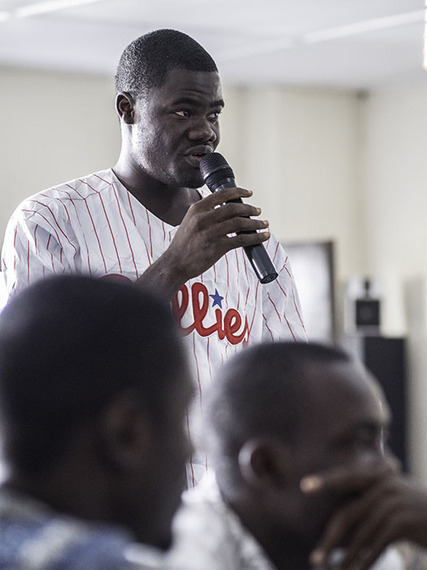The following is a single question, and answer, from an email interview I did with Mohammed Foboi, a 24-year-old Liberian university student who attended a workshop I co-taught in Liberia this past January. He hopes to one day be a journalist. It is obvious from his answer that he already has far more insight and powers of observation than the vast majority of journalists working today. [Please keep in mind that this was written a number of days ago, and so the numbers he sites are now out of date.]
Q: Your family struggled through a decade of civil wars, when life was cheap, and at risk on a daily basis, but somehow they persevered, and even created something good and lasting out of that chaos. Then the country stumbled along for a decade, and now you are confronted by a different kind of enemy, unseen, and even more lethal. How do you cope with that? How does it compare to living through the civil wars? How do you try to protect your loved ones?
A: "Liberia is faced with one of its worst and toughest moments in history. The civil war was visible; you knew where the rebels were and you could run for save haven. As long you were not in the way of stray and direct bullet, or you didn't come in contact with rebels or angry government forces, you were safe. Again, those were humans; they could at one point in time be merciful; you could negotiate with them.
"But we are faced now with a difficult situation, for which the solution seems very distant. Our government is handicapped; it cannot even provide medication for its citizens under normal circumstances. Ninety-percent of our citizens live under the poverty line -- below $1 a day. The virus is spread through physical body contact with the infected person, and we ride with others in cars that are very crowded and it is impossible to avoid bodily contact with another passenger, unless you are in the front seat. A person can incubate (Ebola) without symptoms for 2-21 days, the average being 5-8 days before becoming ill. During this period, you do not know if you are interacting with an infected person. Everyone is now avoiding everyone in the country. You cannot touch your loved ones when they are dead. You cannot even go to them. I mean you cannot even touch your sick father.
"No one wants to know this sickness, because everyone has already been made to know that ebola is the disease that comes with fever, stomach pain, headache, muscle and joint, vomiting, red eyes, diarrhea, and cough. What an interesting country we live in.
"The government has advised citizens not to go near dead bodies, not to even bury your dead mother. Whether she died from malaria, stroke, fever, or typhoid. Ebola now is assumed to be the only killer in Liberia. We fight for space in school buses, cramped together like sardines. The country has up to 75 percent literacy rate in some areas. There is distrust in the system as government lacks the power and equipment to do testing for the virus. More than 10 individuals have been arrested in various communities around the country for allegedly poisoning water wells. They have said that they were paid by government officials to do so to grab the attention of the international community for more support. Dead bodies spent days in homes before being removed, only after community residents take mass action. Bodies have been buried in waterways.
"This is a terrifying situation, especially among the poverty stricken citizens. In my neighborhood, I placed a bucket full of water outside with soap and chloride. I encourage my neighbors, especially kids, to wash their hands every eight minutes, since it is reported that the virus can be killed by soap, bleach, sunlight, or drying when you get it within 10 minutes.
"I head a youth organization, Students Against Destructive Actions and Decisions (SADAD), which has created an awareness campaign on PREVENTION AND MODE OF CONTRACTION. Since I am away from my mother and the other family members, I call them on a daily basis and educate them on the phone in our local dialect. I have also instructed them to practice the washing hands method and avoid shaking hands with people, which is very difficult in Liberia, as shaking hands is a tradition in Liberia.
"I will have a one day visit in my village this Sunday, August 10, 2014, to carry on an awareness campaign among residents of my village and its surrounding villages. That is how I can help because I can't wait to see EBOLA Outbreak in the land of my father's birth."
-----------------------------------
Now that you've met Mohammed, think about this:
Mohammed wants to study in the U.S., either to finish his undergraduate education, or if necessary to start over. I think he has enormous promise, and am trying to figure out how it might be possible to make that happen. If any of you have any ideas, or contacts, please email me directly: bdhuffblog@gmail.com
